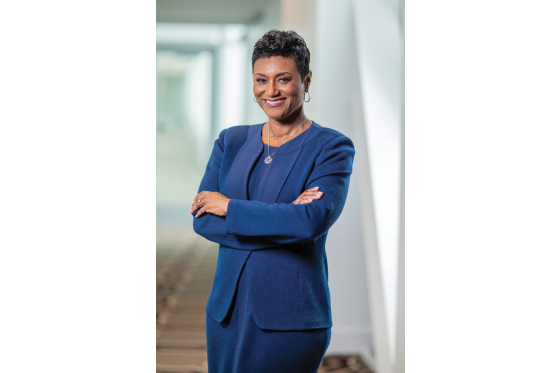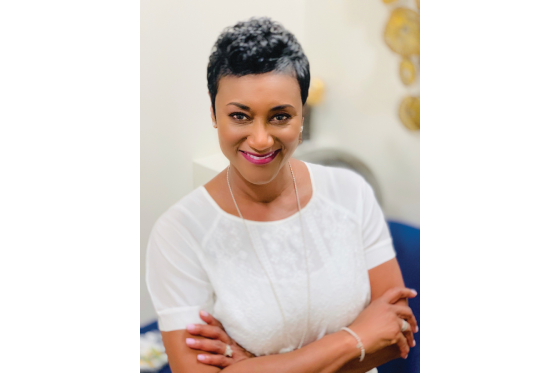Setting a goal number for diversity and inclusion is a nice idea, but Janice Parks doesn’t think it’s the best approach. Numbers only tell part of the story, said Parks, First Hospitality’s chief human resources officer based in Rosemont, Illinois.
“I’m not saying I don’t look at numbers,” she admitted during a March interview with HOTELS. “But if your focus is only on how you need to increase the number of Black employees, you’re missing the other part. I might hit a number and think I’m done.”
Change involves more than simply hiring, she said; it’s about retention and underlying culture, and about understanding the impact of microaggressions.
Contributed by Megan Rowe
To Parks, diversifying a workplace is an organic process. “If you create a culture that embraces diversity and inclusion, it becomes natural,” she said. Building that kind of culture has been her mission since joining First Hospitality.
Hospitality companies have pledged to diversify their leadership ranks for years, but statistically speaking, progress has been slow. Last year’s Castell Project finding that 18.5% of industry workers are Black versus 1.5% of industry executives underscored how endemic the disparity is. The organization also noted that the boards of hospitality public companies and those in the Russell 3000 Index averaged 23% women.
Parks said statistics like those are no surprise. “Maybe because as an African-American woman working my way up at various roles in corporate America, I’ve seen it,” she said. But she also thinks the industry has attracted plenty of Black leaders who simply don’t get the spotlight.
Amplifying diverse voices
Parks — who joined First Hospitality in 2019 after nearly a decade in human resources posts at McDonald’s Corp. — says hospitality employers need to hire and cultivate more diverse candidates to take on increased leadership responsibilities, also providing them with role models. “I believe the opportunity is there — that the industry is open to learning how best to solve this gap in representation,” she said.

At First Hospitality, Parks has taken a multifaceted approach to systemic change. She developed a culture survey and asked the team to share their takes on diversity, what obstacles they had faced and how the company could do better. The results of that survey influenced next steps.
Parks helped establish a diversity and inclusion advisory council — a leadership team of seven employees representing various demographics who are dedicated to building a more diverse workplace. Council members frequently meet with the president and chief executive officer to share what they hear and feel happening in the lower ranks.
First Hospitality looked at the selection process for managers and above with an eye for eliminating systemic biases. That introspection led to a review of training programs to ensure the company was grooming a diverse cross section of employees and to changes in the appointment process.
Today, team interviews and hiring decisions are the norm. Every candidate for a general manager or executive-level role interviews with several executives. “We want to get to the point where those teams are diverse and all weighing in on candidates,” Parks said.
Shining light on bias
Cultural bias in hiring is also under the microscope. “We had multiple managers say, ‘we’ve always been told to hire the friendly face,’ which gets interpreted as someone who looks like them,” Parks noted. “That’s unconscious bias.”
Parks has focused on showing managers where these biases limit their choices.
“It’s not just about figuring out how to hire Black candidates,” she said. “It’s about how to support them once they’re on the team. It means teaching people about cultures, differences and how to work together.” The goal is authenticity and ensuring the organization feels welcoming for all employees.

First Hospitality has also started addressing unconscious bias through staff trainings and raising awareness. Whether a morning session, company rally or awards ceremony, all have a diversity and inclusion component.
“Where are we pulling our talent? How are we getting the right people in front of us and interested?” Parks asked. Recruiting is one of the reasons she has volunteered for Castell@College, a series of Castell Project panels at hospitality schools designed to showcase opportunities for women in the field. “It’s a great way not to only rep the brand, but to share,” she said.
Engagement in tough times
The last year has presented hurdles to recruiting at all, much less to widening the net. The downturn in business has meant some inevitable layoffs, and COVID-19 concerns have drawn some to other industries, but Parks said First Hospitality’s turnover remains lower than the industry average. She believes loyalty depends largely on trust, which in turn demands open communication and engagement.
With many employees working remotely during the pandemic, keeping tabs on their mental and emotional health has been tricky. “Employees may be struggling, but we can’t physically see everybody or take their ‘temperature,’” Parks said. To address that, the company partnered with Blue Cross/Blue Shield to launch Wellness Wednesdays, a series of health-themed programming. The company also hosted a popular step challenge last summer.
Going forward, Parks would like to see the company focus more on developing its associates, something she thinks the team would welcome. “It’s a very smart group, and about 30% of them have been here five to seven years,” she said. “I’d like to see us leverage them as we bring new people into the company.”
Another item on Parks’ wish list is a large-scale internship program that emphasizes diversity. “We’re in the middle of a pandemic, so getting students and interns into the industry has been challenging,” she noted. “But there are opportunities to help support students seeking careers in hospitality.”
Her efforts are working. David Duncan, First Hospitality’s president and chief executive officer, said the cultural shift that Parks has managed will better position the company in a post-pandemic era. “Over the time that [Parks] has been with our company, she has championed the type of transformational change that will help [us] emerge stronger from recent challenges and truly set the pace for our future growth plans.”

